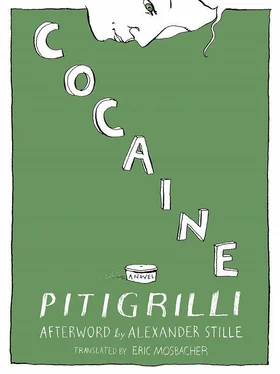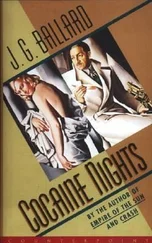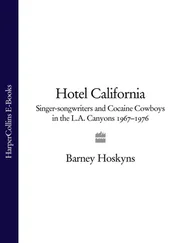“A little more?”
Tito took another pinch. Then he fell silent. He withdrew into a kind of meditation. Then it happened. There was a cold feeling in his nose, a paralysis in the middle of his face. He could no longer feel his nose; it no longer existed.
The man with the wooden storage leg went on taking money and producing little boxes, and the women inhaled in silence. The two men ordered drinks and emptied a whole boxful into a small glass.
“Why don’t you inhale?” Tito’s friend asked.
One of the men replied by leaning his head backwards, showing that his nasal septum was worn away by an ulcer.
“ Coco?” Tito asked.
“Yes,” the young man replied. “It begins with a small scab that itches. It swells slowly and then turns into an ulcer that destroys the cartilaginous part of the septum; fortunately it never reaches the bone.”
“And what did the doctor say?”
“ Rien à faire.”
“Really?”
“Yes. What the doctors say is: Give up cocaine. But I prefer giving up my nasal septum.”
Tito smiled.
The man with the ulcer laughed. He laughed immoderately, frenziedly. The four women, the other man and Tito joined in.
Tito instinctively touched his nose. He seemed no longer to have one, though it was very heavy in spite of its nonexistence.
He laughed again, and the others laughed too.
The drug peddler rose as if to take his departure. “Goodnight, ladies and gentlemen,” he said.
“Don’t go yet,” said Tito, holding him by the round wooden leg. “Stay and have a drink.”
The man sat down next to him, stretched his wooden leg under the table and withdrew the other one.
“You earn more that way than by begging for alms,” the yellow, skeleton-like young man said.
“Yes,” the dealer admitted. “But don’t imagine that begging’s a bad job. It all depends on where you do it. Certainly you can do it anywhere, but some places are far better than others. You do big business outside brothels, for instance. You don’t do so well as outside churches, it’s true, but well enough to make a comfortable living. I prefer working outside churches. In the streets, on the boulevards, at the doors of cafés, there’s a crowd with the average percentage of rogues and fools, but on the steps of churches the percentage is higher; they’re nearly all fools, ninety per cent of them are fools, and you can’t go wrong. Rogues go to church too, of course; actually I’d say that most church-goers are rogues, but going into or coming out of church, which is God’s pied-à-terre, they don’t want to look wicked before or after vowing to be pious.”
The man emptied his glass, put it down, said thank you and made for the door. Just as he reached it a woman stopped him and bought another box.
“Goodbye all,” he called out.
He counted on the effect of his departure, and in fact the other women swarmed round him as if their savior were departing and gave him more money. Tito also bought another box, opened it and inhaled.
“Just look what journalism leads to,” his waiter friend said. “To investigate cocaine addiction you become an addict yourself.”
“And so what?” Tito replied. “It might be much worse. When Pythagoras travelled among the Egyptians he had to be circumcised before being admitted to their mysteries.”
“And what newspaper do you write for?” the pale man asked him confidentially.
“An American newspaper,” Tito replied. “And what’s your job?”
“I haven’t got one,” the pale man replied with great naturalness. “Christine works for me. If I could work without any great effort as Christine does, I’d work for her. But as I can’t…”
Tito’s friend failed to conceal slight surprise at the candor with which the man admitted to being an alphonse.
“Your bourgeois friend is surprised,” he said, alluding to the waiter. “But what’s strange about it? Christine and I used to work in a factory where there were five hundred women. They were all destined for TB, or anemia at the very least. The factory owner exploited them. I couldn’t take away all of them, but rescued Christine, and now I exploit her. I don’t know why I should be regarded as more contemptible than that industrialist who exploited five hundred women at the same time. Particularly as the work she does now is less tiring, more hygienic and more profitable. They say it’s bad for one’s conscience, but what does that matter so long as it doesn’t dirty one’s hands?”
“What’s the time?” asked Tito, thinking it was time to go.
“I haven’t got a watch. Man shortened the days by inventing clocks, and he shortened the years by inventing calendars. I have neither the one nor the other.”
“My calendar’s here,” said Christine, making an indecent gesture.
“And she never makes a mistake,” said her lover, laughing.
Tito turned to his friend and said in an undertone: “The first things that cocaine destroys are the will and the sense of shame.”
“But what shame remains to be destroyed among these people?” said the waiter. “They’re worse than respectable women.”
The article on cocaine addicts was a great success. The American newspaper editor telegraphed one hundred dollars to his nephew even before the article appeared in the centre columns of his sensational news page. A hundred dollars amounted to one thousand francs and convinced him that he was a great journalist; and with that belief in his epigastrium (for that is where arrogance, presumption and pride are situated) the first thing he did was to jump into a taxi, hurry to his shady little hotel in Montmartre, pay the bill, pack his bags, and move to one of the smartest hotels in Paris, the Hotel Napoléon in the Place Vendôme, where he installed himself in an unheated room on the fourth floor, facing the interior courtyard.
That same afternoon he called on the editor of a newspaper with a big circulation called The Fleeting Moment.
The editor was a very elegant individual. It is only aged teachers at technical schools who fail to understand that it is possible to be both intelligent and well dressed. A big ruby on his finger gleamed like a tiny lamp. Like one of those little lamps that novelists compare to big rubies.
“Yes, I know your uncle,” he said, as erect in his armchair as if had been fixed with a u-joint, for an editor’s conscience always remains perfectly upright no matter how much his ship is tossed by stormy seas. “Yes, I know your uncle, and if your flair for journalism is anything like his,” he added, stropping an ivory paper knife on his thigh, “you’ll go a long way. Where did you work in Italy?”
“On the Corriere della Sera.”
“And what were you?”
“Sub-editor.”
“Have you a degree?”
“In law and medicine.”
“And what are your political views?”
“I have none.”
“Good. If you are to argue convincingly for a point of view, it’s better to have none yourself. But the difficulty,” the editor went on, applying his scissors to an English newspaper, “is that I have no vacancies at the moment, and I have no work to offer you. But I shall bear you in mind and send for you as soon as there’s an opening. Where are you staying?”
Tito, gloating over the sensational impact of what he was about to say, replied with deliberate gravity: “The Hotel Napoléon.”
The editor, who had picked up a pen to jot down his address and had pressed a bell to have him shown out, put down the pen and the notebook and sent the commissionaire away.
“I’ll give you a month’s trial on a salary of 1500 francs,” he said.
“Tomorrow’s the first, so let us start tomorrow. Come and see me as soon as you arrive at the office and I’ll introduce you to your colleagues. Goodbye.”
Читать дальше



